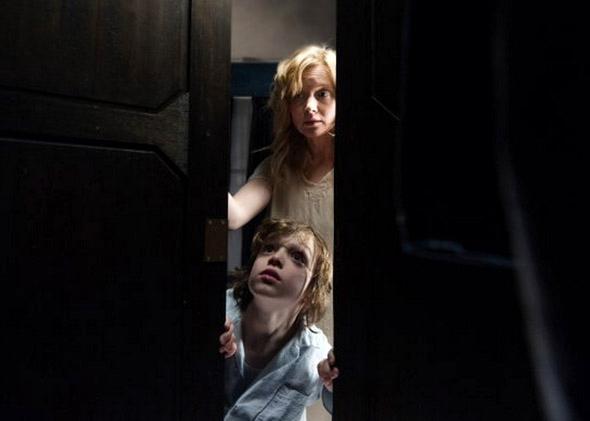The Babadook, the first feature film written and directed by the Australian actress Jennifer Kent, is an example of my favorite kind of monster movie: one in which at every moment the monster is both internally and externally real. An apt metaphor for the hero or heroine’s deepest-buried fears, yes, but also a legit-terrifying creature with both the ability to inflict real bodily harm and, if at all possible, Nosferatu-length claws seen in silhouette against a doorframe.
The Babadook has all that—and also a top hat, though that’s about all we can make out of the dimly glimpsed malevolent being that lurks in the home of single mother Amelia (Essie Davis) and her 6-year-old son Samuel (Noah Wiseman). The Babadook first makes his appearance in a children’s pop-up book, Mister Babadook, that Amelia comes across on Samuel’s shelf one night. (That in itself isn’t the scary part, since, as any parent can attest, kids’ bookshelves do have a way of turning up titles we don’t remember acquiring.) But when Amelia and Sam snuggle in bed to read the book together, the rhymed text they find is macabre and taunting, ending on a promise that if and when the reader ever happens upon the titular bogeyman, “You’ll wish you were dead.”
After soothing her sobbing son to sleep, Amelia puts the creepy book away on a high shelf and forgets about it. She has plenty of non-paranormal reasons to be anxious. Samuel has been acting out aggressively in class, and when the administration calls her in for a concerned sit-down, she decides to pull him out of the school entirely while she looks for another place to send him. Samuel’s a difficult child, fearful and demanding. He often interrupts his mother’s hard-won sleep (and in one scene, her short-lived attempt at masturbation) to spend the rest of the night in her bed. And to add to the exhausted Amelia’s burden, her son’s birthday is approaching—always a painfully conflicted event for Amelia, since Sam’s father died in a crash while driving her to the hospital to have their baby.
So: a stressed-out single parent trapped at home with a hyperimaginative and possibly disturbed child. The long-ago death of a beloved husband and a never-seen father. And a mysteriously menacing children’s book that appears one day on a shelf. What a simple, elegant setup for a psychological horror film about depression, motherhood, grief, and madness. But The Babadook doesn’t stop to congratulate its audience on figuring out that those themes are all, indeed, wrapped up in its monster story. With an assurance that’s rare in a first-time filmmaker, Kent briskly lays out her allegorical cards, then gets right to the business of scaring our pants off.
Amelia and Sam’s nocturnal tormentor is unquestionably a creature of their own making, a collaborative mother/son nightmare born of their difficult relationship—but that doesn’t make him a mere figment of their imaginations. The Babadook, who Samuel insists is a real presence in the house, becomes an embodiment of not only Amelia’s isolation and strain but of her unspoken resentment of her son, and his of her—of their mutual desire, at times, to do away with each other. She finds shards of broken glass in her soup, but not her son’s—tearfully, the boy insists that the Babadook did it. She tears up the ominous pop-up book and throws away the pieces; it reappears on the front doorstep, taped back together, now with more explicit text and pictures implying that Amelia will one day do terrible things to Samuel and herself.
The Babadook creates tension not with jump scares or chase sequences but with judicious editing and slow-burn suspense—that is, until it descends into a final half-hour of harrowing emotional and physical intensity, an extended climax that made me gasp aloud, hide my eyes, and weep at least twice. Kent understands the pleasure, and the humor, of horror, even as she explores the genre’s potential for delivering richer social and psychological meanings. And as the tapped-out, increasingly isolated Amelia, Essie Davis gives a magnificent performance in a very difficult part that requires huge reserves of compassion. Even when her character is doing and saying hideously wrong things to her son, we experience Amelia as a miserable, exhausted, possibly delusional but fundamentally loving parent—someone who any one of us, put in extreme enough circumstances, could easily become.
Often Kent will cut from room to room inside the silent, darkened house as Amelia sits up watching TV in a state of ever-worsening insomnia. (The images that dance before her eyes as she stares, including Georges Méliès animations and old monster movies, enhance the mood of oneiric disorientation.) It’s the rhythmic return to those simple interior montages, in which nothing remotely scary is happening, that invests these spaces with all the potential for dread that will be realized in that throat-gripping last half-hour. Similarly, The Babadook makes everyday domestic life seem like the most natural possible place to encounter monsters of every description, including the monsters that we ourselves have the capacity to become. Related: Would you mind coming down with me to get something I need from the basement?
